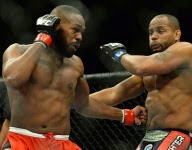Professional sports has become a world of multi-million dollar athletes that are worth much more to the organizations that employ them than they ever have. And as with any other top of the line product, these athletes need protecting, from the outside, and sometimes from themselves. In light of this reality, the Ultimate Fighting Championship has elected to move one of its most prominent fighters into the role of Vice President of Athlete Development and Government Relations. Enter Matt Hughes.
The brief documentary that was broadcast during UFC on Fox 6 shows just how impactful Hughes was to the mixed martial arts community, as former opponents such as BJ Penn, Georges St. Pierre, and Frank Trigg all had glowing words to speak about the former champion. After brutal knockouts from both Penn and Josh Koscheck in his final two matches, Hughes has decided to retire from competition. During the press conference before last weekend’s event it was announced by UFC President Dana White that the Hall of Famer is finished competing, but he isn’t done with the sport.
The role of Vice President of Athlete Development and Government Relations hasn’t been truly defined, but a number of different statements have been made to describe the duties of Matt Hughes’s new position. Zuffa COO Lawrence Epstein was questioned at length about the role and shed some light on some responsibilities that will fall into Hughes’s hands.
One of his first duties will be to play a part in the implementation of the UFC’s fighter code of conduct. As the UFC becomes a larger entity within the sports world, its executives recognize the need to have a concrete code of conduct accessible at all times. Having a respected fighter such as Hughes standing behind the new regulations could potentially give them more credibility among the fighters on the roster, and those that will be added in the years to come.
Though that will be Hughes’s role in the near future, the question is what role Hughes will play over time. Punishment for negative actions while being a part of the UFC has often been doled out in very different manners. Miguel Torres was fired for inappropriate tweets, while Forrest Griffin and Rashad Evans weren’t removed from the organization for similar actions. This is just one example of where fighters were disciplined differently for actions that did not garner the best form of publicity for the UFC as a whole. In his new role, Hughes will be in place to work with these athletes to help keep them out of negative situations.
Epstein stated that the idea for having an individual in charge of athlete development came from looking at the other major sports organizations in the world and the way they manage athlete relations. The NBA and NFL, for example, host annual rookie symposiums after their drafts that teach incoming players about such things as money management, media interactions, and staying out of trouble. As the UFC continues to grow and bring in more fighters, this position is a great step towards developing into a mainstream organization.
However, what happens if Hughes were to side with an athlete who has decided to stand against what the UFC would like him to do? Dana White stated that Hughes “never said no to anything. Fighting anybody or doing whatever he needed to help build the sport and build the brand.” Yet in today’s sports world athletes are beginning to protect their brands more than the company that employs them. Just look back to Jon Jones and UFC 151 for Exhibit A. Will Hughes put himself in a position to defy Dana and the executives of Zuffa, and tell an athlete to do something that may not be exactly what the organization wants? We’ve seen how Dana reacts to an employee who doesn’t do what he thinks is best — there are tweets and radio segments dedicated to his rants — but will he be willing to take aim at Hughes in the same fashion if the situation ever presents itself?
These are major questions that will have to be answered in time. We’ve seen athlete representatives such as Derek Fisher stand up for NBA players, or NFL athletes take a strong position against Roger Goodell, but they are protected, not “independent contractors” like UFC fighters. This is just the tip of the iceberg for the Illinois wrestler that was slamming guys around the Octagon before it was popular.
As the Vice President of Athlete Development and Government Relations, Matt Hughes will be blazing a new and uncertain path, and only time will tell if the former champion is up for the task.




